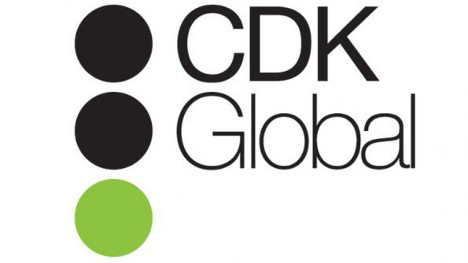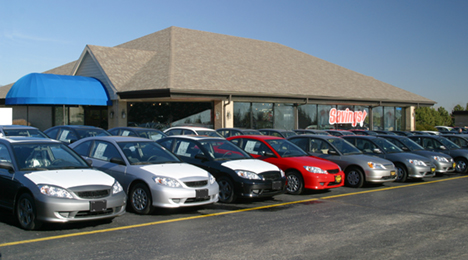Shortly after announcing it will branch off from ADP, rebranding as CDK Global as of Oct. 1, the company formerly known as ADP Dealer Services reported it will offer a new, co-branded financing program for U.S. and Canada-based dealers.
The new offering is in partnership with GE Capital’s Equipment Finance business.
The company explained GE Capital has purchased substantially all of the financing agreements for CDK Global’s clients from ADP Commercial Leasing, CDK Global’s former finance and leasing affiliate.
CDK assured dealerships that have previously financed through ADP Commercial Leasing will feel “little impact from the change, other than the name and contract number.”
“We’re pleased to work with GE Capital to offer our clients the robust financing options they’ve come to expect,” said Bob Karp, North America President of CDK Global. “With the CDK Financial Solutions support team remaining in place, our clients will experience as little disruption to their business as possible as we move our leasing offering to this strong, stable financing provider.”
GE Capital will be offerings its financing solutions to the dealer clients of CDK going forward, but the existing CDK team will continue to “lead the finance relationship,” the companies stated.
Since 2007, GE Capital’s Equipment Finance business has completed $36 billion in lease and loan transactions, and its network includes more than 200,000 customers in over 10 industries.
“We’re excited to provide CDK Global’s dealers with world-class financing options,” said Jim Kelly, managing director of vendor finance at GE Capital, equipment finance. “Through this new program, CDK Global’s dealers will have a reliable provider as well as improved cash management and financial flexibility.”
After its chairman passed away unexpectedly last week, Banco Santander announced this morning it has entered into an agreement to acquire Carfinco Financial Group Inc. for $298 million (CDN) in cash in a deal expected to close in the fourth quarter of this year.
Per the agreement terms, each Carfinco shareholder will receive cash consideration of $11.25 for each common share of Carfinco representing total equity value.
Juan Rodriguez Inciarte, senior executive vice president and head of strategy at Santander, said: "We are excited to sign this agreement with Carfinco, which allows us to enter a market with good growth potential such as Canada, where we hope to reach agreements with other car manufacturers like those we have signed in other countries."
The cash consideration that Carfinco shareholders will receive under the arrangement represents a 32.12 percent premium to the 90-day volume-weighted average share price ending September 15, Carfinco reported.
Furthermore, Carfinco has also agreed to declare and pay a special dividend, which will be payable to shareholders of record on the closing date.
The company explained the amount of the special distribution will be determined closer to the closing date and is subject to necessary approvals.
"We are delighted with the value this all cash offer of $11.25 per share brings to our shareholders," said Tracy Graf, chief executive officer of Carfinco. "We look forward to becoming a division of Santander, one of the top banks in the world, and recognize the benefits their wealth of knowledge, experience and relationships in the auto finance industry will bring to the Canadian market."
Carfinco also shared it didn’t take the deal lightly.
The Carfinco board of directors formed a committee of independent directors “to review and evaluate the terms of the proposal from Santander and to oversee all aspects of the arrangement."
As part of the deal, certain executive officers of Carfinco, including the current president and CEO, the chief operating officer, the chief financial officer and vice president — account acquisition, will be re-investing a portion of their proceeds from the sale of their shares into the entity that will be acquiring Carfinco.
According to the companies’ statement, Graf and certain other key members of the management team will support Santander in the future growth of the company.
After announcing a successful second quarter, Carfinco reported strong growth in both its Canadian and United States operations in August.
In fact, the company reported growth in Canada that represented the largest single month growth since October 2012.
Last month, Carfinco’s Canadian finance receivables grew by 21.8 percent year-over-year.
Farther south, the company’s U.S. receivables grew even more, rising by 34.7 percent from 2013 levels.
Carfinco's consolidated principal balance of finance receivables increased to $286.5 million.
"On the heels of record loan originations for June and July, August loan originations continued to be strong contributing to the growth experienced in the finance receivables," said Tracy Graf, chief executive officer of Carfinco. "Also, as projected, the transfer of the U.S. operations to a new IT platform was completed in August. Carfinco is now in a position to explore geographical expansion opportunities in the United States."
And with over $50,000 available on its Canadian credit facility with a maturity date that was extended to Nov. 1, 2016, there is room for plenty of more growth.
The company’s impressive performance in August led it to announce a cash dividend for stockholders of 4 cents per share in September.
Carfinco Financial Group Inc. announced its second quarter results last week with record results. The company highlighted a record $54 million in loan originations for the quarter, a 19.6 percent increase over last quarter and a year-over-year increase of 26.9 percent.
Carfinco attributes the substantial increase in originations to the diversification of their financial product portfolio and renewed focus on customer service while also expanding their operations in the United States.
2014 Q2 Highlights from Carfinco
- Earnings per share: 20 cents
- Dividends to shareholders: 12 cents/share
- Return on shareholders’ equity: 30.1 percent
- Return on portfolio assets: 8.7 percent
- Revenue: $24.3 million
- Record loan originations: $54 million
- Record finance receivables: $252.1 million
- 31+ day delinquent accounts: 3.5 percent
Tracy Graf, Carfinco’s chief executive officer, emphasized the company’s distant focus in the quarterly report.
“Carfinco continuously evaluates the competitiveness of our credit policies and programs, as we strive to focus more heavily on the long-term strength of our finance receivable portfolio and future earnings growth potential, rather than short-term gains,” Graf said. “We have seen the long-term value of this strategy in the past and expect its continued success going forward. Carfinco also continues to add financing programs that are beneficial to both its dealership group and to business strategy, such as a loyalty program designed to retain its valued customers who have established a positive payment history with Carfinco.”
For more information on Carfinco’s second quarter results, view the full report here.
Canadian dealer satisfaction with finance providers remains elevated, though rates have fallen from record levels seen last year.
That’s according to the results from the 2014 J.D Power 2014 Canadian Dealer Financing Satisfaction study — which takes a look at dealer satisfaction with finance providers in four segments: prime retail credit; retail leasing; floor planning; and subprime retail credit.
The study found that dealers are most satisfied with BMW Financial Services in the prime retail credit segment, while Volkswagen Credit Canada ranks highest in floor planning.
Despite declining satisfaction in two of the four finance segments tracked, overall satisfaction remains high, J.D. Power analysts shared.
Mike Buckingham, senior director of the automotive finance practice at J.D. Power, said the sustained levels of satisfaction are in large part due to the fact that auto lenders have remained focused on building strong relationships with dealers and providing a wide array of financing options for vehicle buyers.
Numbers Slightly Down from 2014
Here’s how the numbers break down:
In the floor planning segment, satisfaction is 924 (on a 1,000-point scale). This marks a 14-point improvement from 2013.
For retail leasing, satisfaction rates were up by 3 points, coming in at 861.
On the other hand, satisfaction in the prime retail credit segment fell by 10 points to 873.
The subprime retail credit segment saw the biggest drops in satisfaction, falling by 24 points to 822.
Here are the factors that went into the satisfaction indexes:
- Dealer satisfaction in the prime retail credit and sub-prime retail credit segments is measured in three factors: finance provider offering; application/approval process; and sales representative relationship.
- In the retail leasing segment, satisfaction is measured in four factors: finance provider offering; application/approval process; vehicle return process; and sales representative relationship.
- In the floor planning segment, satisfaction is measured in four factors: finance provider credit line offering; floor plan support; floor plan portfolio management; and sales representative relationship.
Key Study Findings
The study showed that indirect lending reigns supreme when it comes to consumer preference.
“Indirect lending through captives and banks continues to be the preferred method for consumers seeking affordable loans and leases,” said Buckingham. “The highest performing indirect lenders recognize that it is a relationship-based business model with the dealer community and that focusing on having a dealer-centric staff is a key to success.”
The results showed a variety of factors behind why indirect lending continues to be a favorite for consumers an dealers, such as flexibility.
J.D. Power pointed out “credit policy flexibility and predictability, speed of service (underwriting and funding) and relationship with the lender’s sales representatives are critical to dealer financing satisfaction.”
And dealer satisfaction increases when the lender’s sales rep makes it out the dealership at lease four times every year.
Moving over to highlight the leasing customer, the study found that auto dealers in retail leasing retain 49 percent of their prior leasing customers through retention programs and consumer guidance provided by their lender — perhaps a reason satisfaction for retail leasing lenders remained high this year.
And when it comes to floor plan inventory satisfaction, results shows rates were enhanced when lenders made sure to give their dealers tools and report to help manage their inventory of vehicles.
“Dealers also rely on sales representatives to conduct product training and performance reviews, which lead to more efficiency and cost control in dealership operations,” J.D. Power analysts pointed out.
The same is true for dealers active in the subprime market. According to the study, these dealers expect more product training and general communications from their lenders.
Lender Rankings
The study also ranked lenders when it comes to dealer satisfaction.
Leading the pack for the prime retail credit segment for the second year in a row is BMW Financial Services. This lender came in with a score of 954, up 6 points from last year.
Volkswagen Credit Canada wasn’t far behind, with a score of 938; a 30-point spike from 2013.
Mercedes-Benz Financial Services (930) came in third for prime retail credit satisfaction.
VW Credit Canada took the No.1 spot in floor planning segment, achieving a score of 971. This marks a significant 42-point improvement from last year’s rates. Scotiabank (936) ranks second and Ford Credit Canada (929) third.
There are no official awards presented in the retail leasing and subprime retail credit segments due to insufficient market representation, J.D. Power pointed out, but the company did highlight a few companies that perform particularly well in leasing.
BMW Financial Services, Mercedes-Benz Financial Services and Volkswagen Credit Canada perform particularly well in retail leasing, said company officials.
Scotiabank revealed today a replacement for Ron Porter, who recently retired from the company.
Kevin Teslyk has been named as the company’s new senior vice president of automotive finance.
Teslyk will be responsible for heading up the strategic direction of the bank’s automotive finance operations, including both the prime indirect retail lending and commercial automotive finance businesses, and the non-prime indirect retail lending automotive business at Scotia Dealer Advantage.
The new SVP joined the bank in 1992 and has since then held progressively senior leadership roles in personal and commercial banking, corporate and investment banking, wealth management, finance and global risk management, the company said.
Most recently, the exec was managing director and head for Scotiabank Ltd. in the Bahamas.
In November of last year, he headed back to Canada to begin transitioning into his new position.
Carfinco Notches Loan Origination Records For June & Quarter
In other news from the auto finance sector, Carfinco announced record Canadian loan originations.
The auto loan company achieved $16.4 million in loan originations last months, surpassing Carfinco’s previous record of $15.7 million.
This past month’s results contributed to the company’s quarterly record, as well, with $45.4 million in loan originations.
"These record loan originations validate the finance programs and level of service provided to automotive dealerships across Canada by Carfinco,” stated Tracy Graf, chief executive officer of Carfinco. "We are excited for the future as we continue to develop financing programs that service a broader range of the non-prime automotive financing industry."
Earlier in June, Carfinco announced a cash dividend of 4 cents per share for the month.
The company’s U.S. division, Persian Acceptance Corp., also performed well in June.
PAC garnered $7.9 million in loan originations for the quarter.
This represents the highest quarterly loan originations for PAC since being acquired by Carfinco in September of 2013, the company said.
Perhaps a result of this success, Carfinco announced in mid-June it had repaid all outstanding subordinated debt provided by third parties to PAC.
The total amount of sub-debt currently provided to PAC is $5.8 million in U.S. dollars and carries an annual interest rate of 13 percent.
"By repaying the outstanding sub-debt held by its US subsidiary, Carfinco will realize pre-tax interest cost savings of approximately $575,000 in Canadian funds on an annualized basis", stated Graf. "This is a substantial savings for Carfinco and moves our financial leverage ratio to approximately 2.40-to-1. This brings the financial leverage ratio closer to management's expectations of 3.0-to-1, yet retains flexibility to pursue additional opportunities."
Under the terms of the sub-debt agreements, the sub-debt may be repaid at any time without penalty, the company said.
After upwards of 40 recalls this spring and a class action lawsuit launched against the company in April, a group of prominent GM Canada dealers is suing the company and its parent General Motors Co.
Adria MacKenzie, corporate communications manager at GM Canada told Auto Remarketing Canada this morning, "A number of Toronto dealers have taken legal action against GM. The claims are without merit, and we plan to defend against them vigorously."
"We will continue to be focused on our customers," MacKenzie added.
According to a Sunday report from The Globe and Mail, the dealers are suing on the basis that the automaker has ignored their requests for financial help in the light of a drastic drop in sales and market share in Toronto.
The group of dealers — which now sits at 17 — is being represented by the law firm Lax O’Sullivan Scott Lisus of Toronto, according to The Globe and Mail.
And this isn’t the first time GM Canada has been targeted by its dealers.
In fact, this suit makes the fourth time groups of former or current GM dealers have filed against GM Canada.
This news comes five years after the company went under Chapter 11 bankruptcy protection in 2009 and survived with help from a bailout from U.S. and Canada.
GM Canada said it will not provide further comment as the matter is before the courts.
This news comes on the heels of a Canadian class action suit filed in April.
Merchant Law Group LLP launched a Canada-wide class action against the manufacturer concerning the recall of the ignition-switch allegedly linked to 13 accidental deaths.
"The ignition switch defect is a widespread problem affecting more than 235,000 General Motors vehicles in Canada. Owners of these GM vehicles are at risk and can experience a sudden unexpected loss of power and engine shut down due to the ignition defect alleged by this class action. Our class action seeks compensation for affected vehicle owners and proper repair of these GM vehicles," stated Tony Merchant, Q.C., of Merchant Law Group in April.
For more information, see the following Auto Remarketing Canada story:
Canadian Class Action Launched Against GM
Editor’s Note: Stay tuned to Auto Remarketing Canada for more updates as the most recent GM Canada dealer lawsuit develops.
In news relevant to both dealers and consumers, CarProof data reveals that more than one-third of the vehicles have a lien, or security for debt owing.
The company shared, interestingly, this is a fact that most Canadians are “largely unaware of.”
Specifically, CarProof’s study of vehicle history reports showed that 37 percent of vehicles in Canada have a current lien on them.
Liens present an interesting issue for both dealers and consumers as they represent the right of a lender to keep possession of the vehicle belonging to another person until a debt owed by that person is paid in full.
After discovering how common car liens are, CarProof conducted a consumer survey to measure how aware Canadian consumers really are when it comes to this issue.
Survey results shows 63 percent of respondents “underestimated the presence of liens.”
That said, most respondents — 88 percent — said they do see the value of a lien search before buying a used vehicle.
Many vehicle history reports include this information, such as CarProof and Carfax.
In response to the study, CarProof put together a video further detailing what a lien is and how to look for one during the vehicle shopping process.
To see the video and additional resources, click here.
Buy-here, pay-here and lease-here, pay-here financing has seen significant growth in popularity in Canada during the past few years. In the United States, there are approximately 28,000 dealers providing this form of financing to customers.
These dealers understand that BHPH financing can be very profitable if it’s done right, but it can also very costly if you don’t have the right policies, procedures and controls in place.
In the United States, the BHPH business is considered a mature segment of the special finance industry. For BHPH dealers the target market for this financing are people with poor credit or no credit: people on a fixed income, immigrants, people with low credit scores, and people who cannot get traditional financing.
Their credit status may have been damaged as a result of a job loss, a divorce, a business failure, a mortgage foreclosure or similar circumstances. They are not bad people; they are people who need help reestablishing their credit status.
So why are dealers in Canada well positioned to take advantage of this form of financing? The answers have a lot to do with the increased age and mileage of used vehicles still on the road combined with advancements in technology that have occurred in the BHPH business in the United States.
- Vehicle Inventory
Dealers providing customers with BHPH financing are generally offering older, high-mileage vehicles that provide customers with reliable transportation in a financing program where the term is short and the payment is affordable.
In the February 2013 issue of the Automotive Industries Association of Canada, DesRosiers Automotive Consultants stated that the average age of light duty vehicles in Canada was 9.26 years. Currently that would make the average age closer to 10.5 years old.
With the appropriate reconditioning, these older, high-mileage vehicles provide an ideal source of inventory for BHPH financing. In the past, this type of vehicle might have been considered strictly for wholesale at auction.
Today, more dealers are recognizing the value of these vehicles in the form of BHPH financing. Franchised new-car dealers with multiple locations have an upper hand when it comes to acquiring vehicles for their BHPH inventory because of the higher volume of trade-ins.
- Customer Retention
One of the objectives of BHPH financing is to help customers rebuild their credit status. A BHPH dealer has the responsibility to help the customer select a vehicle that has financing payments the customer can afford. BHPH customers are typically not good money managers, so missed payments or late payments are part of the reality with BHPH financing.
The successful BHPH operators will work with these customers through the term of the financing, keeping them in their vehicle, making payments and getting caught up on late payments. Dealers with this approach view repossessing the vehicle as the last resort. The end result is the customer has paid of the vehicle financing with the help and patience of the dealer. This relationship-building approach to BHPH financing develops strong customer loyalty, in addition to repeat and referral business.
- Technology
Advancements is technology have had a major impact on the BHPH industry. Not long ago, a BHPH dealer required customers to show up at the car lot in person to make payments, usually in the form of cash. This made collections time consuming and inconvenient, and required handling large amounts of cash.
Today, advancements in payment technology provide customers with a wide range of payment options including: payments through the dealer’s website, third-party payment portals, online banking payments, direct debit payments and ACH (automated clearing house) payments.
The BHPH industry has shifted from “in-person payments” to “convenience-based payments” to achieve efficiency in their collections process and improved delinquency rates. In addition to advancements in payment technology, the BHPH industry has seen a major impact from advances in Starter Interrupt Technology (SID) and Global Positioning System (GPS).
SID technology permits a dealer to electronically notify customers that a payment is due. If required, the dealer can disable the starter temporarily until the customer contacts the dealer to discuss the past due payment. This collections technology helps customers remember their payment date and reduces the dealer’s need to contact customers by phone.
GPS technology has helped improve the asset recovery part of the BHPH industry. If a customer defaults on a loan payment and refuses to contact the dealer or make a payment arrangement, this new technology permits a dealer to locate and recover the vehicle quickly and efficiently.
- Resources
Today, there are a number of resources available to help a dealer start a BHPH operation or improve their current BHPH business. These resources include cash flow and profitability projections; policies and procedures manuals; staff training; guidance to determine the right BHPH business model; and even a comprehensive BHPH start-up program.
Also, dealers can now participate in a “20 Group” designed specifically for BHPH/LHPH dealers in Canada. This time-tested form of networking provides dealers with analysis and comparison of the BHPH operation with other BHPH dealers across the country.
These resources mean that a dealer doesn’t have to learn the BHPH financing business by trial and error. The most successful BHPH dealers will tell you that “the school of hard knocks” is an expensive form of education in the BHPH business.
For these reasons and more, this truly is the time to be in the BHPH business.
Mark Dubois is president of Dealer Performance and Consulting. He can be reached at (941) 729-2357 or [email protected].
In an effort to “streamline” the sales and finance data between Hyundai dealers and Hyundai Auto Canada Corp., Dealertrack Canada revealed Wednesday the launch of an advanced finance portal to all 210 Hyundai dealers in Canada.
The new Hyundai-branded portal, powered by Dealertrack, will be directly integrated into the OEM's systems.
This will work to enable credit application submissions and deliver real-time data updates, including the latest incentives and aftermarket offerings, new inventory and certified pre-owned program data, to Hyundai dealers who are financing transactions through the Dealertrack Network, the company explained.
"This new portal will help create greater workflow efficiencies for both Hyundai Auto Canada and its dealers, significantly transforming their businesses and their interactions with their OEM," said Michael McCarthy, general manager, Dealertrack Canada. "We are committed to working with OEMs in Canada to improve their processes to help deliver bottom-line results to both the OEM and their dealerships."
Dealertrack Canada, headquarters in Mississauga, Ontario, has more than 100 team members, which will work to provide direct regional support to Hyundai dealer and OEM customers.
"Hyundai and Hyundai dealers continue to embrace new technologies, systems and processes to improve the way we do business," said Don Romano, chief operating officer, Hyundai Auto Canada Corp. "The new Hyundai Dealer Portal will allow us to improve communication and information sharing with our dealers, helping us make better decisions as we grow and manage our business."












